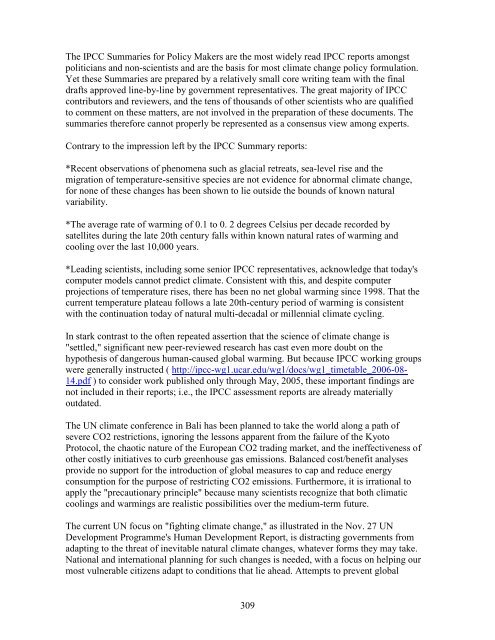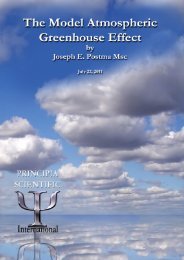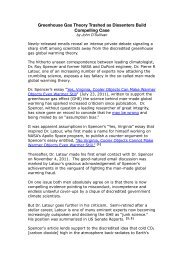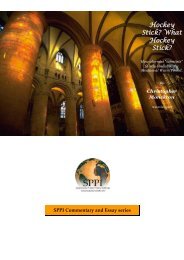- Page 1 and 2:
Climate Depot Special Report: More
- Page 3 and 4:
change - RIP: Cause of Death: No sc
- Page 5 and 6:
know how poor the underlying scienc
- Page 7 and 8:
about the science. See: UN Fears (M
- Page 9 and 10:
Open Letter to the UN Secretary-Gen
- Page 11 and 12:
variability. 2) Almost all climate
- Page 13 and 14:
eceives most energy from the Sun an
- Page 15 and 16:
indeed help make the planet greener
- Page 17 and 18:
continued: ―Because the effect is
- Page 19 and 20:
and innocent citizens for global wa
- Page 21 and 22:
the atmosphere has not warmed since
- Page 23 and 24:
35 Prof. Dr. Horst Malberg Universi
- Page 25 and 26:
Louis J. Allamandola, Director, Ast
- Page 27 and 28:
University of California at Davis (
- Page 29 and 30:
Riccardo DeSalvo, Senior Scientist
- Page 31 and 32:
National Laboratories (retired) R&D
- Page 33 and 34:
Jack M. Hollander, Professor Emerit
- Page 35 and 36:
Sau-Hai Lam, Emeritus Professor of
- Page 37 and 38:
Christopher R. Monroe, Bice Zorn Pr
- Page 39 and 40:
S. Fred Singer, Professor of Enviro
- Page 41 and 42:
Joseph F. Chiang, Professor and For
- Page 43 and 44:
Uberto Crescenti, Ph.D, Past-Presid
- Page 45 and 46:
Brian Valentine, Ph.D, U.S. Departm
- Page 47 and 48:
3. Computer-based models can meanin
- Page 49 and 50:
Ian R. Bock, BSc, PhD, DSc, Biologi
- Page 51 and 52:
of Auckland, New Zealand Willem de
- Page 53 and 54:
William M. Gray, PhD, Professor Eme
- Page 55 and 56:
David R. Legates, PhD, University o
- Page 57 and 58:
Sciences Department, St. Cloud Stat
- Page 59 and 60:
State Climatologists (1998-2000), C
- Page 61 and 62:
Manager, Oregon Websites and Waters
- Page 63 and 64:
As of December 2010, there were 712
- Page 65:
Penkala BS (Chemical Engineering, U
- Page 68 and 69:
U. S. Senate Minority Report: More
- Page 70 and 71:
eceive a PhD in meteorology, and fo
- Page 72 and 73:
“Creating an ideology pegged to c
- Page 74 and 75:
Proponents of man-made global warmi
- Page 76 and 77:
Scientists Speak: More Than 700 Int
- Page 78 and 79:
perhaps derailing the gravy train.
- Page 80 and 81:
José Ramón Arévalo, Professor of
- Page 82 and 83:
on April 11, 2008. Smit credited Go
- Page 84 and 85:
and, in the case of North America,
- Page 86 and 87:
Senior Meteorologist Dr. Wolfgang P
- Page 88 and 89:
misadventure, and one from which es
- Page 90 and 91:
environmentalists believe climate f
- Page 92 and 93:
predictions of man-made global warm
- Page 94 and 95:
skeptic. ―Steward came to the iss
- Page 96 and 97:
Professor of Ecological Studies, Dr
- Page 98 and 99:
University of Alaska) in the last p
- Page 100 and 101:
as International Journal of Climato
- Page 102 and 103:
human influence.‖ ―It is one th
- Page 104 and 105:
Chief Meteorologist Mike Thompson o
- Page 106 and 107:
will enter a ‗little ice age‘ w
- Page 108 and 109:
momentum toward connecting human ac
- Page 110 and 111:
has taught meteorology courses at b
- Page 112 and 113:
fuels is allegedly warming the plan
- Page 114 and 115:
Chemical Engineer Ed Rademacher, wh
- Page 116 and 117:
Oklahoma, U.S.A.; D. Hebert, PhD, F
- Page 118 and 119:
esearch focuses on the interface be
- Page 120 and 121:
Dr. Jon Hartzler, a retired science
- Page 122 and 123:
the cart before the horse. It is gl
- Page 124 and 125:
ecently in the by-election in their
- Page 126 and 127:
1855, and rose back to about 440 pp
- Page 128 and 129:
always be climate change and from t
- Page 130 and 131:
Man-made or Natural?D on June 16, 2
- Page 132 and 133:
Dr. William DiPuccio, a retired wea
- Page 134 and 135:
Former Belgian Meteorologist and As
- Page 136 and 137:
concluded by noting that it was a
- Page 138 and 139:
is to dance the dance of the saddle
- Page 140 and 141:
“embarrassed NASA” with his ala
- Page 142 and 143:
awarding of which is highly subject
- Page 144 and 145:
model-predicted mid-troposphere ‗
- Page 146 and 147:
cycles remain subject to legitimate
- Page 148 and 149:
on a moral or religious overtone,
- Page 150 and 151:
the natural forces that cause clima
- Page 152 and 153:
natural variability caused in large
- Page 154 and 155:
Mathematical Physicist Dr. Frank Ti
- Page 156 and 157:
United Nations. It is not a scienti
- Page 158 and 159:
five or ten years, and I‘ll have
- Page 160 and 161:
Award-winning atmospheric scientist
- Page 162 and 163:
man-made climate fears in 2009. ―
- Page 164 and 165:
Complete Reprint of 2007 report: U.
- Page 166 and 167:
Scientists from Around the World Di
- Page 168 and 169:
The UN Framework Convention on Clim
- Page 170 and 171:
India: One of India's leading geolo
- Page 172 and 173:
Background: Only 52 Scientists Part
- Page 174 and 175:
people to accept unverified, remote
- Page 176 and 177:
Atmospheric Physicist Dr. Garth W.
- Page 178 and 179:
of the warming, if it comes, will b
- Page 180 and 181:
the score at the beginning would be
- Page 182 and 183:
a 'Little Ice Age,'" Moore said. "T
- Page 184 and 185:
Corporate Climate Coup" which detai
- Page 186 and 187:
School of Ocean Earth Sciences and
- Page 188 and 189:
esearch receives massive increases
- Page 190 and 191:
Shaviv, the CO2 temperature link is
- Page 192 and 193:
French climatologist Dr. Marcel Ler
- Page 194 and 195:
leading climatologists (such as Ric
- Page 196 and 197:
of catastrophic man-made global war
- Page 198 and 199:
published a new booklet entitled "T
- Page 200 and 201:
climate," Karlen wrote to EPW regar
- Page 202 and 203:
alternative to climate catastrophis
- Page 204 and 205:
Group 1 report) is to enable them t
- Page 206 and 207:
Award winning Chief Meteorologist J
- Page 208 and 209:
Marine Biologist Daniel Botkin, Pre
- Page 210 and 211:
proclaimed his man-made climate ske
- Page 212 and 213:
forced to correct several schoolboy
- Page 214 and 215:
French scientist Vincent Courtillot
- Page 216 and 217:
disturbing aspects of the IPCC repo
- Page 218 and 219:
interview. Clark, an on-air weather
- Page 220 and 221:
names engraved on the IPCC report a
- Page 222 and 223:
greenhouse effect hasn't been impor
- Page 224 and 225:
Policymakers] SPM was the statement
- Page 226 and 227:
indications from solar studies that
- Page 228 and 229:
match the data. Given the observati
- Page 230 and 231:
desperate attempts to shore up thei
- Page 232 and 233:
Nations Intergovernmental Panel on
- Page 234 and 235:
in the late 1980's. I went to the [
- Page 236 and 237:
science advisor to the Science and
- Page 238 and 239:
Last Millennium, continued, "As rec
- Page 240 and 241:
Physics professor Kjell Aleklett of
- Page 242 and 243:
EPW, "Variable processes in nature
- Page 244 and 245:
Atmospheric scientist Bruce Schwoeg
- Page 246 and 247:
alternative thesis on global warmin
- Page 248 and 249:
odourless gas whose only detrimenta
- Page 250 and 251:
about 5 degrees warmer than it is n
- Page 252 and 253:
University in Canada, rejected glob
- Page 254 and 255:
warming.'" "In the 70s, in the wake
- Page 256 and 257:
notion that we are on the road to r
- Page 258 and 259: Yury Izrael, the director of Global
- Page 260 and 261: what they are saying. Many of the a
- Page 262 and 263: June 13, 2005. "Of the two main rea
- Page 264 and 265: provided by the libertarian Cato In
- Page 266 and 267: "The most potent greenhouse gas is
- Page 268 and 269: Hydro-climatologist Stewart Franks
- Page 270 and 271: Dr. Peter Ridd, a Reader in Physics
- Page 272 and 273: warming. "At the moment, we really
- Page 274 and 275: limitation. The proxies can be calc
- Page 276 and 277: temperatures since 1998. This clear
- Page 278 and 279: that there are many natural forces
- Page 280 and 281: less discussed today, for instance,
- Page 282 and 283: Sun still appears to be the main fo
- Page 284 and 285: greater cloudiness means a larger d
- Page 286 and 287: Iowa Meteorologists George Waldenbe
- Page 288 and 289: CO2," Clark said according to a Nov
- Page 290 and 291: future polar bear extinctions. "I t
- Page 292 and 293: News Channel on August 19, 2007. "T
- Page 294 and 295: Rial concluded, "I believe that to
- Page 296 and 297: which can't even simulate some basi
- Page 298 and 299: climate models disagree strongly ab
- Page 300 and 301: Sampling of inconvenient scientific
- Page 302 and 303: A September 2007 peer-reviewed stud
- Page 304 and 305: system. Furthermore, the climate is
- Page 306 and 307: University of Washington's Polar Sc
- Page 310 and 311: climate change from occurring are u
- Page 312 and 313: Craig D. Idso, PhD, Chairman, Cente
- Page 314 and 315: Mr. David Nowell, M.Sc., Fellow of
- Page 316 and 317: Attachment Number Two: 60 Prominent
- Page 318 and 319: Mr. David Nowell, M.Sc. (Meteorolog
- Page 320 and 321: Dr Benny Peiser, professor of socia





